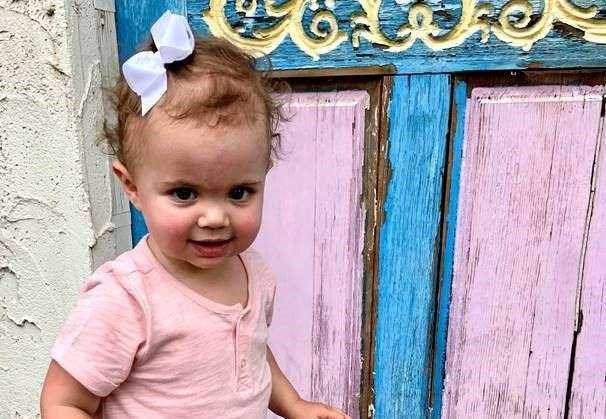Collins is a smiley five-month-old baby girl born in Arizona to parents Kristen and Bijan. She loves to make funny noises, blow raspberries, stomp her feet and practice rolling over. She also loves watching Kerry, the family dog, as she runs around the house.
Being born during the uncertainty of a pandemic meant that Collins and her parents only spent one night in the hospital when she was born. She was followed closely in the first week of life by her pediatrician. By day 5 of life Collins continued to lose weight despite mom’s milk being fully in. The pediatrician decided to order a blood test and check her bilirubin levels. To her surprise Collins’ bloodwork showed she had jaundice. But not the newborn type of jaundice that many babies have. This type was surely an indicator that there was something wrong with her liver. Collins was referred to a hepatologist at Phoenix Children’s when she was just 15 days old, which gave her the best chance of correcting the issue in her liver before it became too damaged. Kristen and Bijan were heartbroken and scared from what they found on the internet about the rare disease she likely had. They knew that her eventual diagnosis would just be the beginning of a long and scary road for the whole family.
At 17 days old Collins underwent her first surgery to diagnose her disease and perform a potentially life-saving surgery pioneered by a doctor from Japan, known as a Kasai procedure. Kristen and Bijan were told the surgery had a 25% success rate and if unsuccessful she would need a liver transplant before the age of one. Biliary atresia is a very rare disease with fewer than 400 children a year born with it in the United States. Biliary Atresia is a liver disease in which the inner and outer bile ducts of the liver are abnormally narrow, blocked or absent. As a result, bile does not leave the body as it should causing further damage to the liver. The liver is a spectacular workhorse of the body managing aspects of life such as electrolyte levels, red-blood cell breakdown, bile creation, vitamin storage, and much more. Children with BA face malnutrition, growth problems and vitamin deficiency among other complication.
Collins’ Kasai procedure was deemed a failure and she was evaluated and placed on the transplant waiting lists at two hospitals at just 3 1/2 months old. Kristen and Bijan pray that their little girl is blessed with a new liver and a second chance at life.
Volunteers are working to raise an estimated $75,000 to assist with transplant-related expenses. Unfortunately there are more children who need a transplant than organs available in the US so Collins will incur significant medical costs awaiting a new liver as well as life-long costs post-transplant. Covid-19 complicates the care she can receive and might require both of her parents to leave their jobs to care for her. They have asked the Children’s Organ Transplant Association (COTA) for help. COTA is a national charity dedicated to organizing and guiding communities in raising funds for patients in need of a life-saving transplant. COTA is the nation’s only fundraising organization solely dedicated to raising life-saving dollars in honor of transplant-needy children and young adults. 100% of each contribution made to COTA in honor of patients helps meet transplant-related expenses. COTA’s services are free to families, and gifts to COTA are tax deductible to the fullest extent of the law.
Please consider a tax-deductible contribution to COTA in honor of Collins. A liver transplant is not a cure but will ensure Collins has the best chance of a near-normal life. Many companies match your donation to a 501(c)3 organization like COTA. Please click on “See if your company will match your gift” under the GIVE NOW button to request a matching donation.

